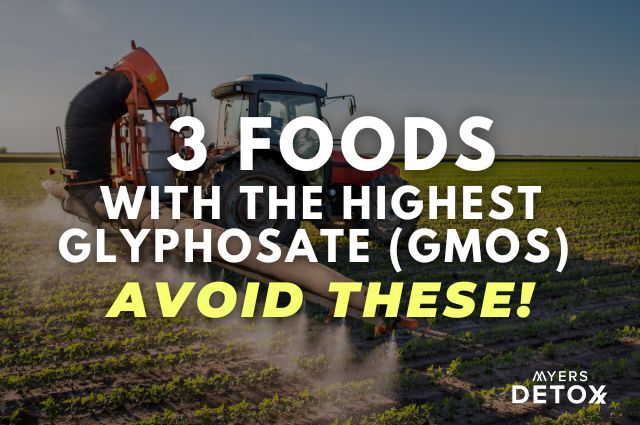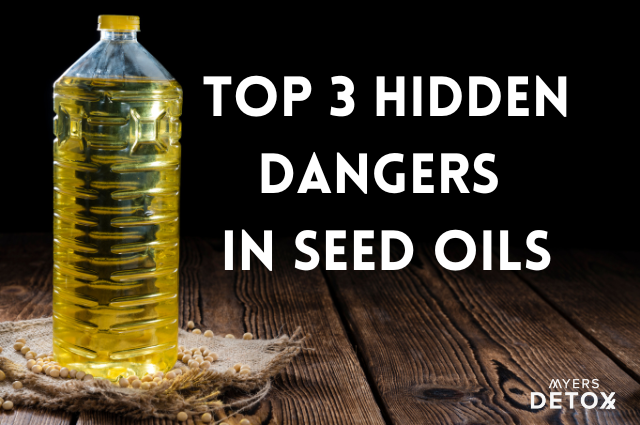Glyphosate is an herbicide that’s been widely used since the 1970s to purportedly enhance crop yield (but it doesn’t). When glyphosate first came on the scene, we were told that this pesticide was harmless to humans and would actually benefit our agricultural industry and increase food production.
Sales and use of glyphosate continue to soar – to the tune of 18.9 Billion pounds (8.6 Billion Kilograms) sprayed worldwide since 1974 (7).
The problem is that now that glyphosate is widely used there is mounting evidence that glyphosate is very harmful to human health. We explore why in this article.
In this article, we’ll discuss:
- How prevalent glyphosate is in our food supply
- The known toxic effects of glyphosate
- The three foods with the highest levels of glyphosate that you must avoid
- The most important thing you can do to combat glyphosate toxicity
But first, watch this video:
What Is Glyphosate and How did it get in our Food Supply
So, how did this toxic weed killer make its way into our food supply?
Dr. Stephanie Seneff (senior research scientist at MIT) explains that when glyphosate was first developed as a weed killer, we were assured that glyphosate only affects a biological pathway in plants (the shikimate pathway) that does not exist in human cells. Therefore, glyphosate should be perfectly safe for humans.
And if that wasn’t enough to get the agricultural industry excited, the advent of GMO crops came along which were specifically resistant to glyphosate – which means that they could spray this chemical freely, killing off any plant that might get in the way of crop yields without ever having to worry about destroying the crops themselves.
It sounds pretty great, right?
Well, when things sound too good to be true, it’s usually because they are.
What we’ve learned in recent years is that our gut microbes actually do have the shikimate pathway, and they use it to make essential nutrients for your body that you can’t make on your own.
Once this information was uncovered, researchers finally took the time to look at what glyphosate may be doing to animals in small doses, and the results are both shocking and devastating, including everything from reproductive harm to organ system toxicity[1].
As you can imagine, if glyphosate were proven to be harmful to human health, it would take a devastating financial toll on several large companies (Monsanto – owned by Bayer – being chief among them), so studies like the one mentioned above have been “mysteriously” retracted.
Luckily, we have the brilliant minds of researchers and Ph.D.s like Dr. Seneff to shine a bright light on what’s really happening with this toxic chemical and provide us with the information we need to protect our health and the health of those we love from the persistent exposure to this harmful herbicide.
The Toxic Effects Of Glyphosate

At this point, it’s really hard to say how toxic glyphosate is since robust research studies have not received the funding they deserve. With that being said, a class action lawsuit involving tens of thousands of plaintiffs claimed that glyphosate caused their non-hodgkin’s lymphoma. The lawsuit was settled in 2019, with Bayer (owner of Monsanto) paying out $10 billion to settle the claims.
Glyphosate negatively affects many systems in the body. We know that glyphosate increases cellular toxicity, we also know that it can overload the liver and cause dysfunction, damage the thyroid, and finally, the negative impact on gut health is indisputable.
Cellular Toxicity
First, we know that glyphosate sticks around in the body for long periods of time, bioaccumulating in your cells. Exactly how this happens, we have yet to determine, but Dr. Seneff believes that glyphosate can substitute for the amino acid glycine.
If you’re unfamiliar, amino acids are the building blocks of proteins in your body. Proteins are not only crucial for the structure and function of your entire body, but they also play critical roles in cellular maintenance, repair, signaling, and much more.
When glyphosate substitutes for glycine, an amino acid, it becomes incorporated into protein molecules, which in turn inhibits the protein’s ability to carry out its normal functions. The result? Cellular dysfunction and disease.
Perhaps the biggest hit that glyphosate takes when substituting for glycine is the impact on detoxification. Glycine plays a key role in several aspects of detoxification, including acting as a methyl donor and a precursor for antioxidants. When glyphosate displaces glycine in a protein, it can inhibit the pathways we need for glutathione function, the body’s main antioxidant to aid in detoxification[8]. Glyphosate is so toxic, it inhibits your body’s ability to detox other toxins!
Glyphosate can displace glycine in proteins, which means that when it’s incorporated into proteins where the body needs glycine instead, it can significantly disrupt the protein’s ability to function. In chronic fatigue syndrome, for instance, glyphosate could be substituting for glycine in myosin (which is a muscle protein). When this happens it can cause the muscle to not contract and function properly.
Glyphosate can also disrupt enzyme activity by getting in the way of the active site of the enzyme, which is where chemical messengers dock to send signals. Since enzymes play a vital role in every system in your body, the impacts of faulty enzymes can be devastating.
Liver Overload and Dysfunction
As you can imagine, the toxic toll of glyphosate does a number on your liver. It’s not surprising then that as the use of glyphosate has continued to soar, so too have rates of fatty liver disease.
The connection here is rooted in the liver enzyme PEPCK (phosphoenolpyruvate carboxykinase). PEPCK converts nutrients into glucose in the liver, assisting in maintaining your blood sugar levels.
However, when glyphosate comes into contact with PEPCK, it disrupts its function and inhibits the release of glucose into the blood. The result is fat accumulation in the liver – AKA fatty liver.
Due to its vital role in blood sugar regulation, the dysregulation of PEPCK can also become a precursor to other metabolic conditions like diabetes.
Furthermore, the toxic burden of glyphosate takes a toll on your body’s natural detoxification systems. This means that your liver and kidneys aren’t able to regulate your everyday toxic load as well, which in turn, makes all other toxic inputs all the more impactful.
Gut Health
As I already mentioned, glyphosate has a particularly disruptive effect on gut health. It not only interferes with the shikimate pathway and, therefore, the production of essential nutrients, but it impacts the overall balance of bacteria in your gut.
In fact, studies show that lactobacillus and bifidobacteria (good bacteria) are killed by glyphosate, while yeast and harmful bacteria like salmonella are more resistant. When good bacteria are killed off, and harmful bacteria are allowed to thrive, it creates an imbalance in your gut that can lead to inflammation, leaky gut, yeast infections, food sensitivities, autoimmunity and several other downstream imbalances[2].
Furthermore, glyphosate acts as a chelating agent, which means that it can bind and interfere with other compounds. In the gut, glyphosate binds to essential minerals like manganese, zinc, iron, cobalt, and sulfur. This is a huge problem because certain bacteria rely on these nutrients for their proper function. As a result, glyphosate crates nutrient deficiencies along with toxicity at the same time.
And if that isn’t enough, glyphosate ingestion also suppresses stomach acid, which impairs digestion and absorption of nutrients. Protein, in particular, is reliant on stomach acid to be broken down into smaller units so that it can be absorbed.
This is one of the reasons that we’re seeing an upsurge in digestive problems in the United States.
This information is not meant to scare you but rather to give you the knowledge you need to empower your food choices. Which brings us to the next subject, which foods should you avoid to reduce your glyphosate exposure?
3 Foods With The Highest Glyphosate Levels
Sadly, due to the widespread use of glyphosate, it may be impossible to avoid it altogether. However, there are steps you can take to mitigate exposure, and the first one is to avoid crops that are known to contain high levels of glyphosate. The top three crops to remove from your diet include:
#1 Soy
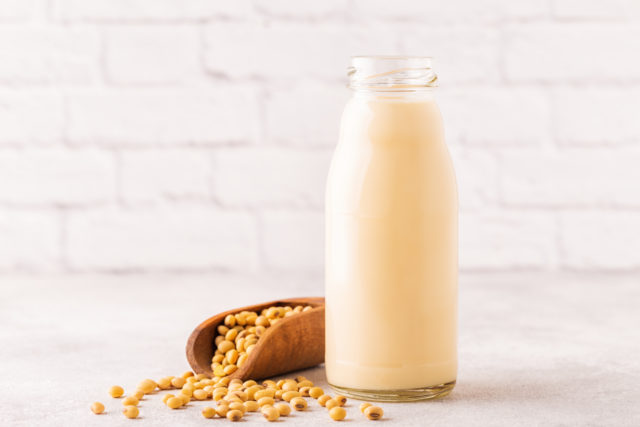
Studies show that globally, glyphosate-tolerant GMO soy is the number one genetically modified plant. And as of 2020, reports showed that 94% of the soybean crops in the United States were genetically modified. In other words, 94% of the soy produced in the US likely contains high levels of glyphosate[5][6].
#2 Wheat
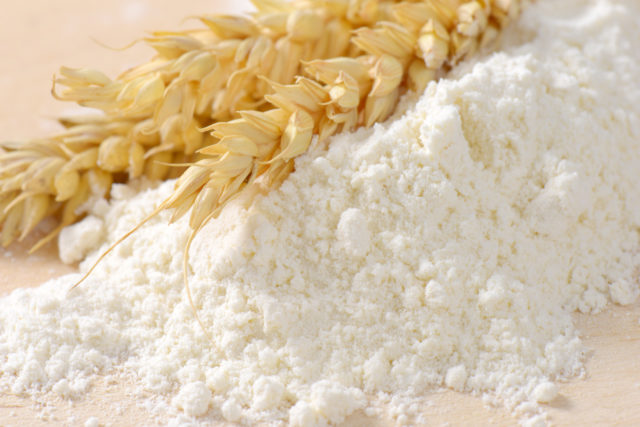
The Environmental Working Group (EWG) decided to test wheat products, which showed that 100% of the products tested contained detectable levels of glyphosate.
To back up their findings, the Canadian Food Inspection Agency found glyphosate contamination in 80 to 90% of popular wheat-based products such as pizza, crackers, and pasta[4].
#3 Oats
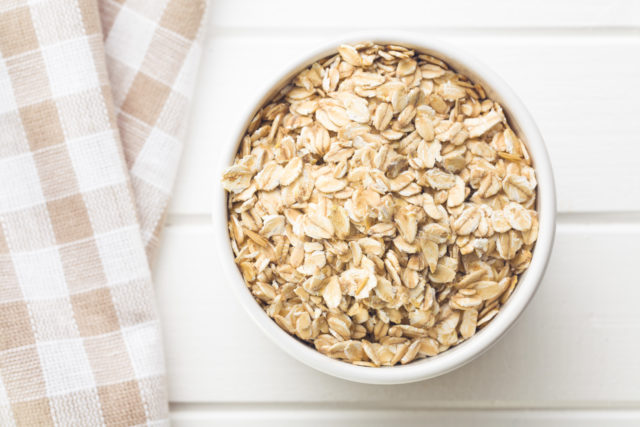
When the Environmental Working Group (EWG) commissioned two tests of popular oat-based food samples, they found glyphosate in 95% of the products.
Furthermore, when they looked at the organic market, they found glyphosate in one-third of the products. While this may sound surprising, when you understand how widespread the use of glyphosate is these days, it’s easy to see how this chemical could travel and cross-contaminate all kinds of crops – whether they’re directly sprayed or not[3].
Mitigating Inescapable Exposure
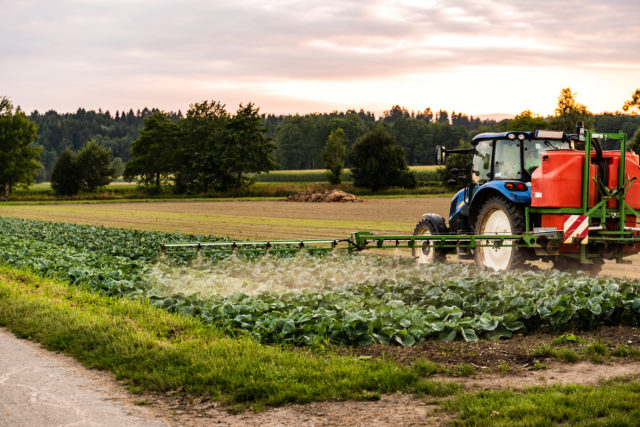
As mentioned, at this point, even organic crops are becoming contaminated with glyphosate. The sad truth is that as the use of glyphosate continues to grow, it will be hard to find any crops that are completely free of contamination.
Glyphosate is the most used herbicide in human history[7]:
- 3.5 Billion pounds (1.6 Billion Kilograms) sprayed across America since 1974
- 18.9 Billion pounds (8.6 Billion Kilograms) sprayed worldwide since 1974
- Glyphosate use has increased 15-fold since genetically modified crops were introduced in 1996
While taking measures like avoiding oats, wheat, and soy will certainly help, that’s likely not going to be enough to mitigate the harmful effects of glyphosate. So, what can you do?
If glyphosate creates its damage by lodging into your cells and destroying your gut microbiome, the best plan of attack that you have is to upregulate your detoxification pathways and make sure that your gut microbes are getting the food they need to stay happy and healthy.
In my Daily Detox formula, I not only include herbs and superfoods to assist your body’s powerful detox mechanisms, but I also have a specific blend of nutrients that support digestive health.
Specifically, ingredients like inulin and flaxseed provide your bacteria with the prebiotic nutrients that your beneficial gut bacteria need to grow and thrive. These are the same bacteria that would be wiped out in the presence of glyphosate. By feeding your bacteria on a consistent basis you’re arming them with the fuel they need to survive toxic insults, while also allowing them to proliferate and expand their army.
Daily Detox also includes a wide variety of herbs and superfoods that are tailor-picked to support all phases of detox in your body. L iver support like milk thistle and dandelion and medicinal mushrooms, and superfoods like moringa and acai all work synergistically to enhance your body’s natural detoxification processes. By infusing your body with these incredibly powerful nutrients each day you’re setting yourself up for success as you interact with a world that is riddled with toxins.
iver support like milk thistle and dandelion and medicinal mushrooms, and superfoods like moringa and acai all work synergistically to enhance your body’s natural detoxification processes. By infusing your body with these incredibly powerful nutrients each day you’re setting yourself up for success as you interact with a world that is riddled with toxins.
I created Daily Detox for one reason; I wanted to provide clients (and myself) with a formula that they could take every day that would cover their basis for toxic exposure. The world we live in today looks very different than it did one hundred years ago. Our toxic load has increased significantly, and our bodies haven’t been able to keep up. Unfortunately, biological evolution doesn’t move as fast as technological evolution.
Therefore, it’s up to us to help our biological systems keep up by leveraging the powerful nutrients that mother nature has provided for us – and that’s exactly what Daily Detox accomplishes.
Takeaway
The advent of GMO foods and the increasing use of pesticides like glyphosate have left us in a serious health predicament. The same foods that are supposed to be supporting our bodies are now contaminated with toxins that are destroying our cells.
As we continue to see a rise in health crises worldwide, it’s becoming clear that our food supply needs a significant makeover. Unfortunately, the authorities that are responsible for our safety when it comes to agriculture are sitting back and allowing this use of this poison, and the entire planet is paying the price.
You can take measures to mitigate the harm of toxins like glyphosate by avoiding GMO foods (especially wheat, oats, and soy) and assisting your body’s natural detoxification processes with supplements like Daily Detox.
*These statements have not been reviewed by the FDA. Daily Detox is a dietary supplement and is not intended to diagnose, treat, cure, or prevent any disease. It is not intended to replace any medication or healing modality prescribed by your medical doctor. Please consult with your doctor before beginning a new supplement regimen.


